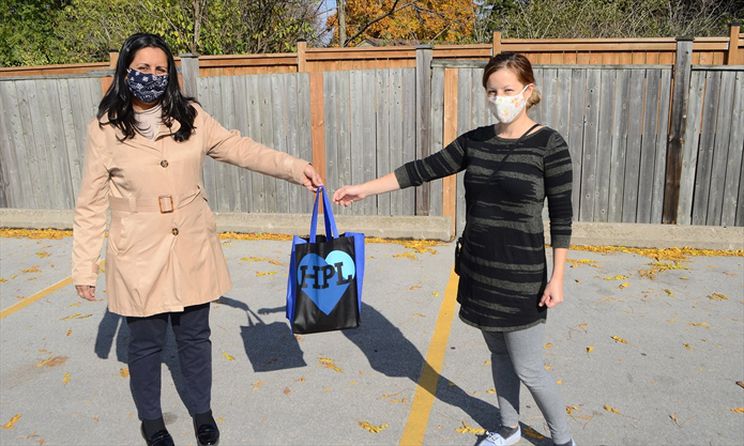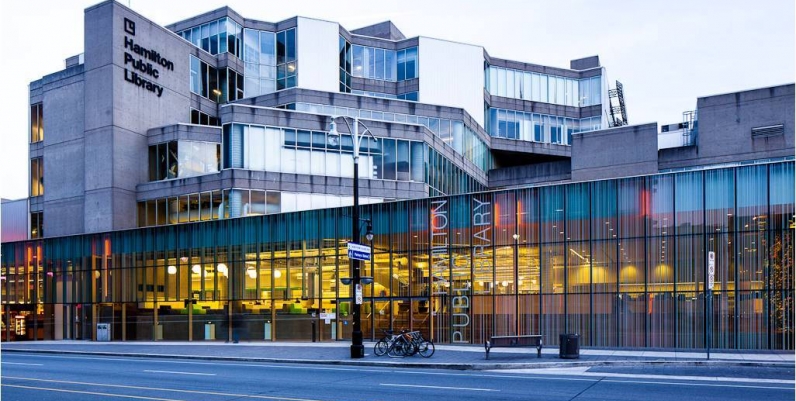
As a child, Lisa Radha Weaver says she spent most Sunday afternoons at the Kitchener Public Library in Ontario. She has fond memories of the friendly library staff helping her load up as many books as she could carry home.
Then, as a college student at Trent and Queen’s Universities, Weaver again was struck by how kind and generous the people were behind the reference desk at the library. Finally, she asked: How do you get this job?
Weaver learned about the pathway to become a professional librarian. So, after finishing her undergraduate degree in education, she earned her master of library and information science at Western University in London, Ontario.
“I knew that I wanted to serve the public in the same way that I had always been served at all the libraries that I had the privilege of growing up with in the first half of my life,” said Weaver, now director of collections and program development at Hamilton Public Library (HPL) in Ontario.
But that public service role was tested in the spring of 2020 when HPL closed due to COVID-19, as she and her fellow library staff were left wondering how they were going to get books to members who were now locked out of their physical collection. Weaver had been instrumental in helping HPL become an early adopter of the Internet Archive’s Open Libraries program, which offers digital access to the physical books that a library owns. Because of the collections team’s hard work, HPL patrons had access to tens of thousands of books from the safety of their homes, and could continue to read and learn while the physical library remained closed.

In recognition of her contributions in her 20-plus year career, and her foresight in leading HPL into new digital lending practices, Weaver has been named the recipient of the 2021 Internet Archive Hero Award. The annual award recognizes those who have exhibited leadership in making information available for digital learners all over the world. Past recipients have included Michelle Wu, Phillips Academy, the Biodiversity Heritage Library, and the Grateful Dead.
Weaver has long been committed to broadening access to information. Not everyone is as lucky as she was to have an adult bring them to the library, she says. Others don’t live nearby or work hours that limit their ability to physically visit a branch. To serve the changing needs of users, she has embraced digitizing collections and innovative outreach.
Weaver led efforts at HPL to become an early adopter of Controlled Digital Lending, as well as identify special collections to donate to the Internet Archives for digitization.
“CDL means removing barriers to access to collections in a way that is sustainable, accessible and equitable. With one library card, users have access to THE library, not just your local branch, system, region, province, state or even country,” Weaver said. “CDL means great breadth and depth in collections access. No one library can have all the books. CDL helps all libraries work together to best support each member to find what they are looking for, when and where they are looking for it.”
“I just really believe the library should be there for everyone, where they are and when they need it.”
Lisa Radha Weaver, 2021 Internet Archive Hero Award Recipient
The timing of HPL’s embrace of CDL in the fall of 2019 was fortuitous. When the physical buildings had to close due to the pandemic in March 2020 for three months, the library was positioned to provide users with digital access to its collection through the Internet Archive.
“Our hearts were a little bit less heavy, knowing that at least that part of our collection continued to be accessible to people,” Weaver said. “We had positive feedback.”
HPL also beefed up its own virtual library collection and created a range of online programming. Weaver says it developed an online reference system so users could call, email or chat to get connected to the resources or collections, which was especially helpful to teachers and students. Staff also phoned older members of the library to just check in and some were thankful to learn about new ways to access the library online.
Weaver says her team at the library is fearless and collaborative in how they approach their work.
She credits support from her administration and green light from the library’s legal team with the success of the CDL at Hamilton. Management promotes the notion of a “freedom to fail card” to encourage risk-taking, which says she seized upon to embark on the practice. Also, the library got a legal option that it shared widely backing up the notion that it was well within the library’s right to participate. “Those two things really allowed us to step forward confidently with the Internet Archive in this project,” Weaver said.

Since 2019, Weaver has joined the call for wider acceptance of CDL. She has participated in several panel presentations with librarians to explain the details of CDL. She has also lobbied with others in Washington, D.C., making the case to lawmakers on Capitol Hill for policy that supports the practice. Weaver is known for her professionalism and thoughtfulness in promoting the benefit of CDL.
“The ‘c’ in CDL is controlled. One copy, one use,” Weaver said. “We already own these books. Why did we buy these books, if not, for the broader library community to access? None of us are closing our libraries because we are running out of books, so doesn’t it make sense to share? Most people buy into that idea.”
Before joining HPL in 2018, Weaver was with the Toronto District School Board as manager of collections and extension services for 13 years. In that role, she coordinated operations with the largest library system in Canada and worked with diverse communities to expand digital access to learning materials for students. Weaver was honored by the Ontario School Library Association with the 2006 Mover and Shaker Award and the 2016 Award for Technical Service.
The motivation in all her work is simple: “I just really believe the library should be there for everyone, where they are and when they need it.”
Congratulations Lisa. You are a dedicated and hard working librarian so happy to see you be recognized by your peers. Sheila